Woman Refuses To Get Rid Of Her Dog For Her Stepdaughter, Who Has A Serious Dog Phobia
An extreme dog phobia is known as cynophobia. The Greek word "cyno," which means dog, serves as the source of the phobia's name.
Both children and adults who have this phobia make a special effort to avoid dogs. They may even experience a full-blown panic attack or severe anxiety whenever they hear a dog barking, watch a movie about a dog, or go to a place where a dog might be living.
In extreme circumstances, those who suffer from this phobia shun friends or choose to stay home out of fear of encountering a dog. Experts believe that a combination of hereditary factors, individual history, and environmental variables contributes to phobias.
Anxiety disorders and mental illnesses increase a person's risk of developing a phobia. If they have had a traumatic experience with a dog or another animal, they may be more prone to developing cynophobia.
In today’s story, we have a 15-year-old girl who has a phobia of dogs. According to the OP’s husband, who is her father, it was due to a "general culture against dogs where she was raised, but that culture intensified when there was a tragedy a few years ago involving dogs and some neighborhood children." However, the OP has a 6-year-old golden retriever, Auggie, whom they adore, and they knew it might be a problem since the OP’s stepdaughter was visiting for the summer.
How it all started...

This is her first summer visit since her father and I got together
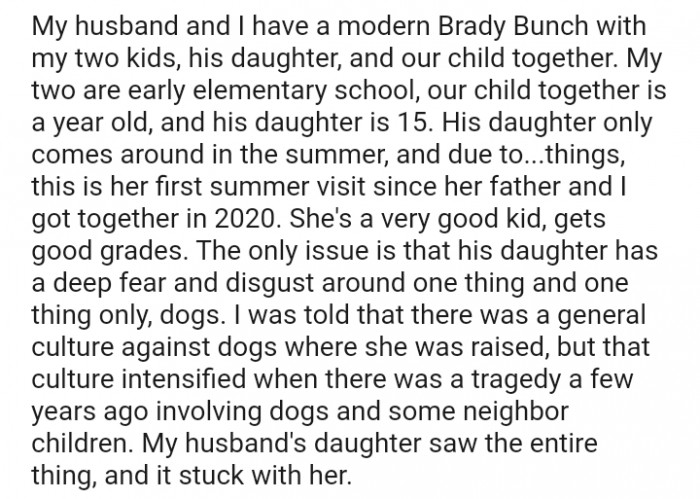
It sounded like an emergency
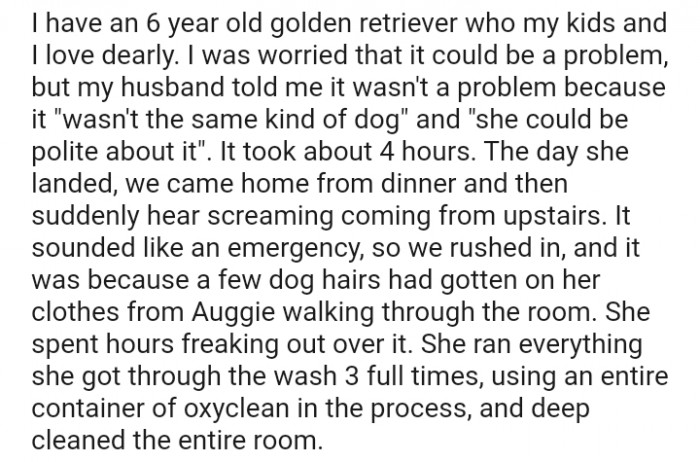
Understanding Phobias and Emotional Responses
Phobias are intense, irrational fears that can significantly impact an individual's quality of life. Research in clinical psychology indicates that phobias often stem from early experiences, where specific events can create lasting fears. In this case, the stepdaughter's serious dog phobia illustrates how past experiences can shape emotional responses and influence current relationships.
Studies show that understanding the roots of phobias can help individuals and their families navigate these challenges more effectively, fostering empathy and support.
She refused to sit on the living room furniture
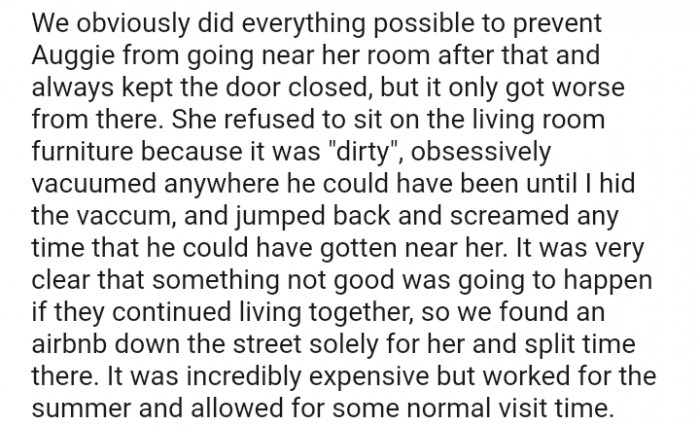
I will NOT get rid of Auggie

In just one day of being posted to the r/AITA subreddit page, the thread received 5K upvotes, an award, and 1.7K comments. Redditors had a lot to say, especially since the OP referred to her stepdaughter as a "part-time child."
We’ve gathered a selection of their replies, so keep scrolling to check them all out.
1. Her parents need to get her therapy

Additionally, the dynamics of family relationships can complicate responses to phobias. A psychologist specializing in anxiety disorders points out that family members may struggle to understand the severity of a loved one's phobia, leading to conflict and feelings of invalidation. The woman's refusal to get rid of her dog might be perceived as a lack of love for her stepdaughter, but it highlights the complexity of balancing emotional needs within blended families.
Recognizing these dynamics is essential for fostering compassion and understanding among family members.
2. Encourage him to get her evaluated
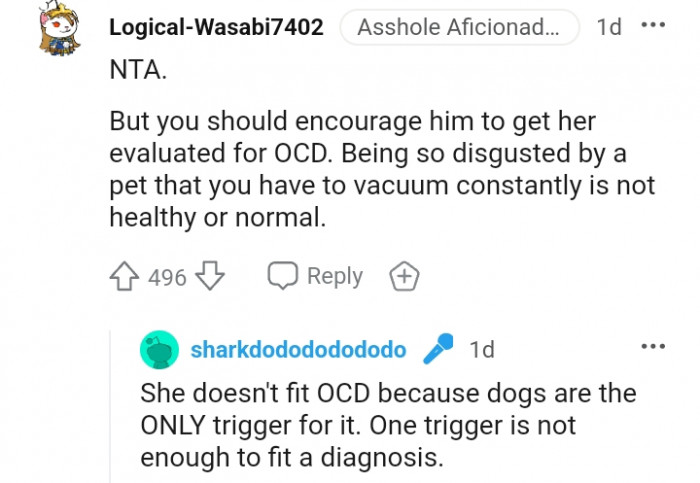
3. You'd do more harm to the children
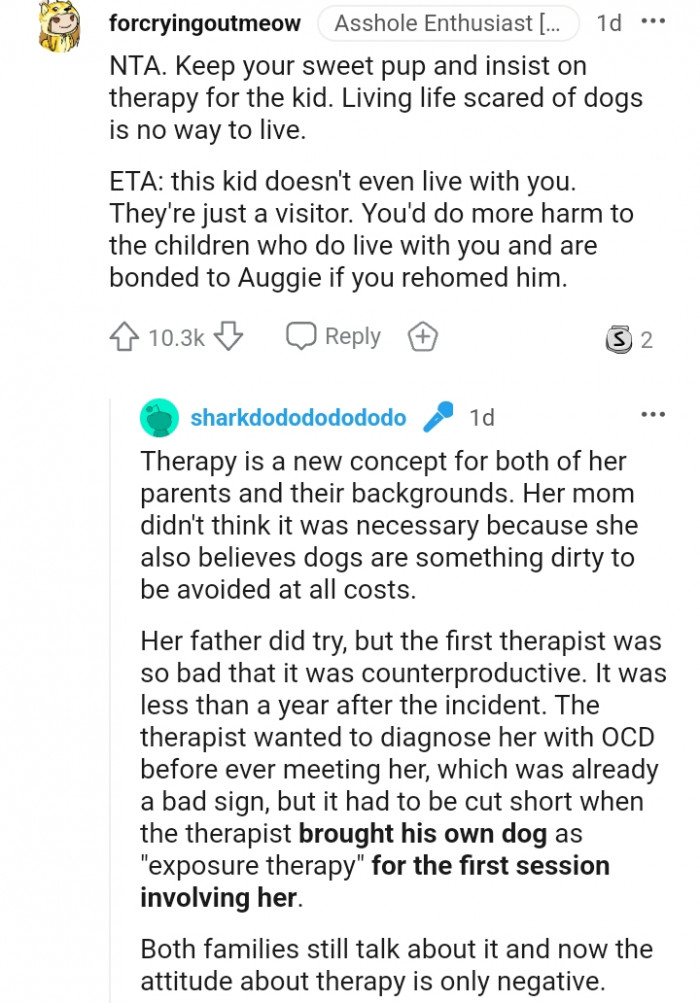
4. Her reactions were so outsized
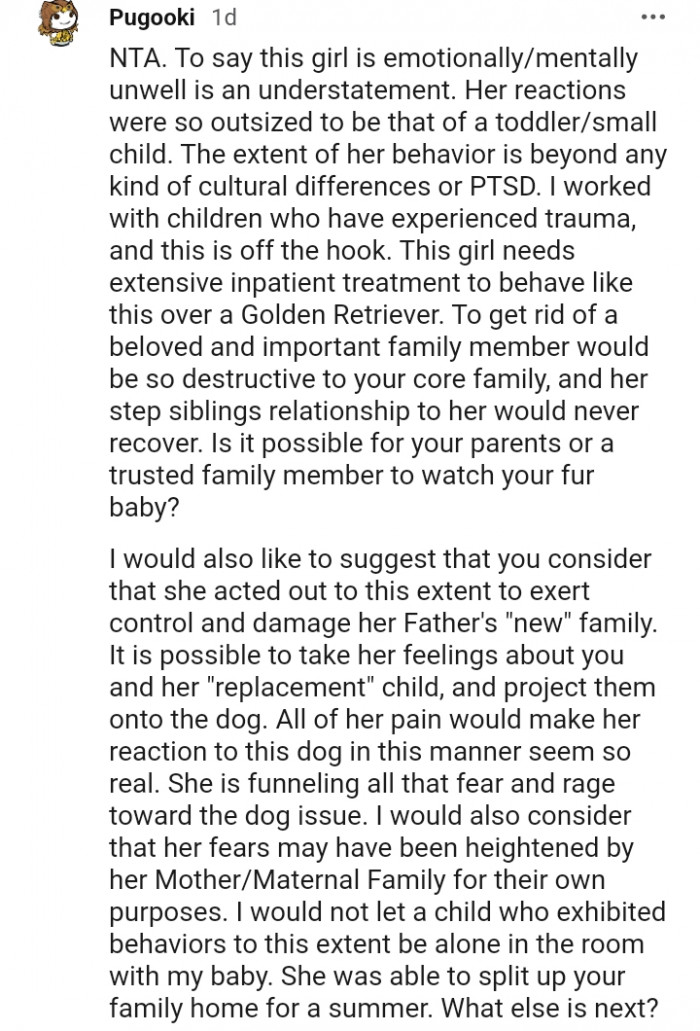
Strategies for Supporting Family Members with Phobias
To effectively support a family member with a phobia, open communication and empathy are crucial. Research in family therapy suggests that creating a safe space for individuals to express their fears can lead to better understanding and cooperation. The woman could benefit from discussing her stepdaughter's phobia openly, allowing her to share her feelings and experiences related to dogs.
This approach aligns with therapeutic practices that emphasize validation and support, fostering a more harmonious family environment.
5. She is still your husband's child
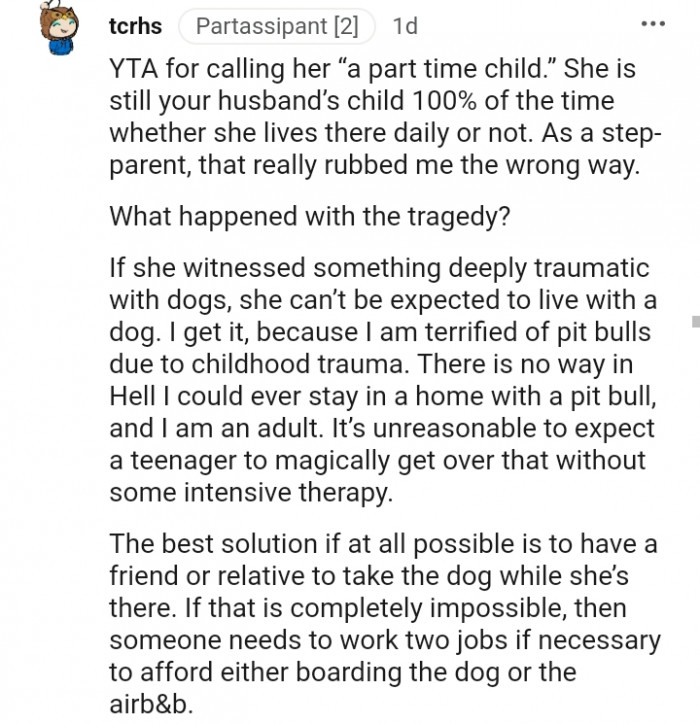
6. The sooner she gets help, the better
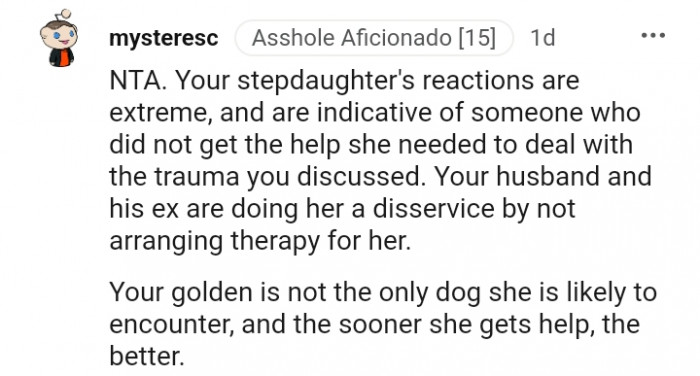
7. Boarding your dog should be cheaper

Moreover, gradual exposure techniques can be an effective way to address phobias. Studies show that slowly introducing individuals to their fears in a controlled manner can help desensitize their anxiety responses. The woman might consider working with a therapist to create a plan that allows her stepdaughter to gradually become more comfortable with the dog, all while ensuring her emotional safety throughout the process.
This approach not only addresses the phobia but also strengthens family bonds by promoting understanding and cooperation.
8. You don't value her as much
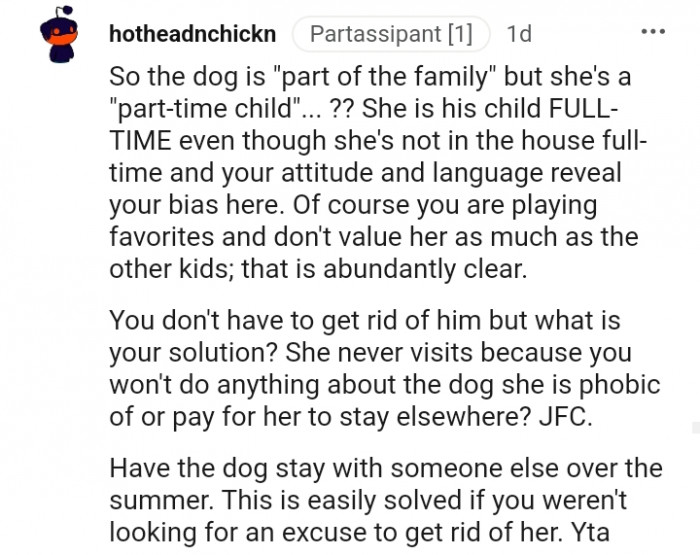
9. You need to discuss this with a therapist
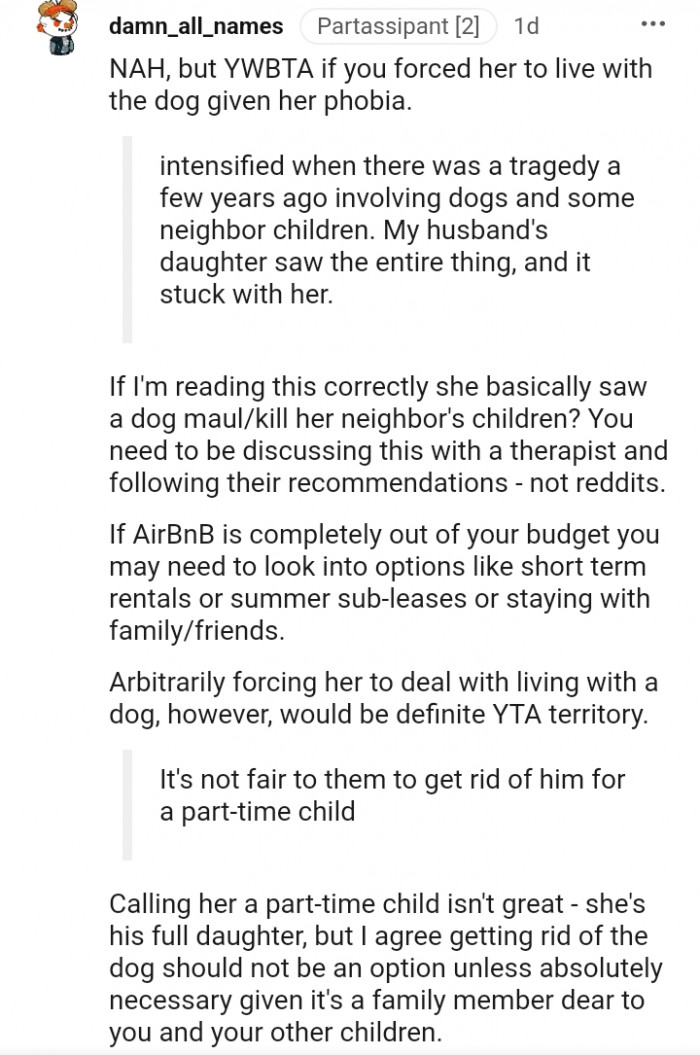
10. The girl's issues are beyond her control

11. She is part of your family

12. You are trying to prevent her from visiting

13. Board the dog

14. The answer needs to be the child
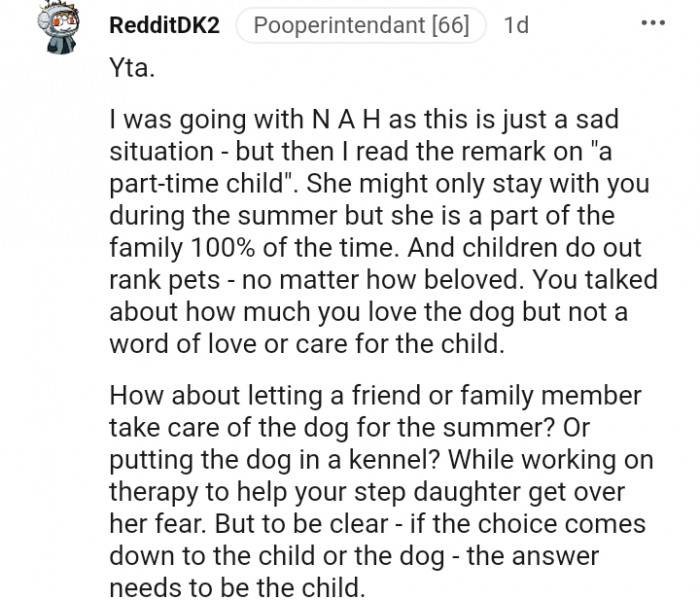
15. He barely sees his kid
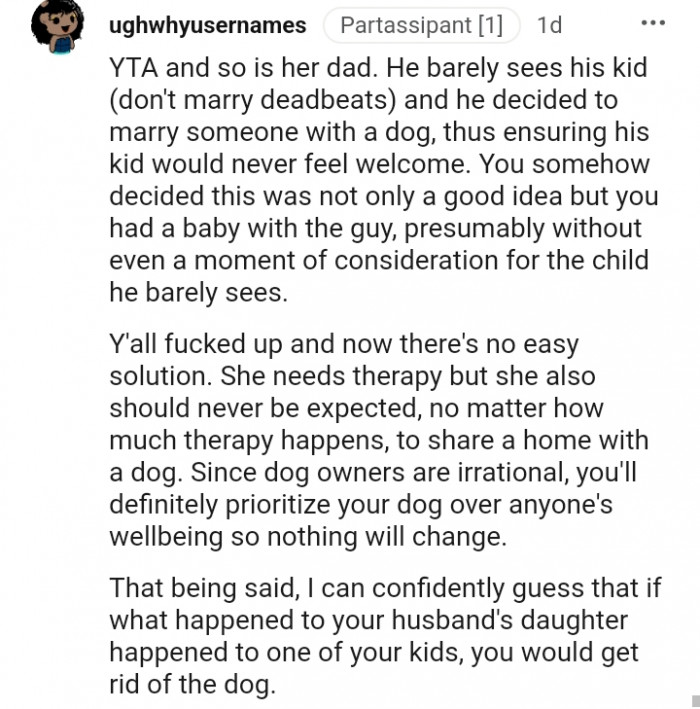
16. Getting rid of the dog would cause resentment
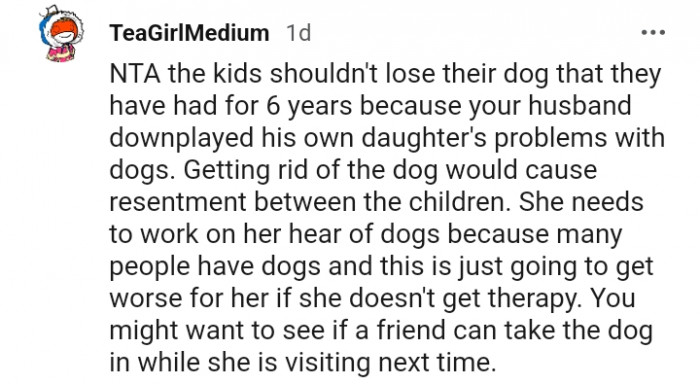
17. They'll choose a dog over a person

18. It's time to reassess your coping methods

19. She is your husband's child
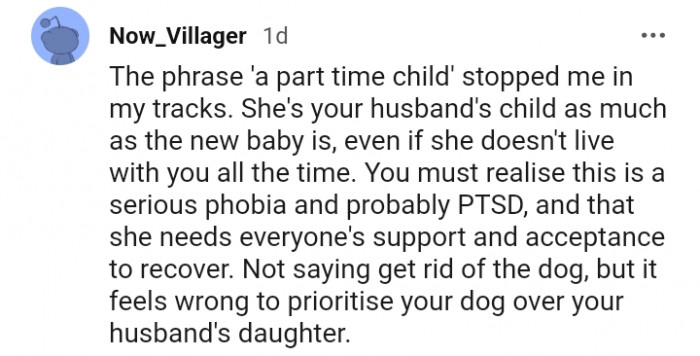
20. Pets are not more important than children

When people who have cynophobia think about or see a dog, they tend to experience intense anxiety, fear, and panic attacks. They believe they are in danger, so they make sure to clean and re-clean the entire place.
Redditors had diverse opinions, but we’d love to hear what you have to say. Drop your replies in the comments section below.
Psychological Analysis
This situation exemplifies the challenges that arise when personal fears intersect with family dynamics. The stepdaughter's dog phobia and the woman's attachment to her pet create a complex emotional landscape. By fostering open communication and understanding, families can navigate these challenges more effectively, promoting both emotional safety and connection.
Analysis generated by AI
Analysis & Alternative Approaches
Phobias are complex emotional responses that can create significant challenges within family dynamics. Research supports the idea that understanding the roots of these fears and fostering open communication can facilitate healing and cooperation. By employing strategies focused on empathy and gradual exposure, families can navigate these challenges more effectively, enhancing relationships while addressing individual needs.



